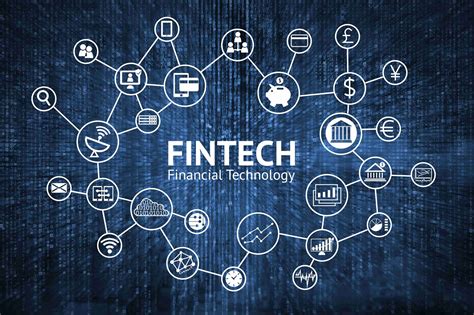In the realm of financial services, FinTech is playing a pivotal role in reshaping traditional landscapes and revolutionizing the way we interact with money. From blockchain technology to artificial intelligence applications, the innovations in FinTech are driving significant changes across the industry.
Let's delve into the transformative power of these innovations and explore their implications for the future of finance.

Overview of FinTech Innovations
FinTech, short for Financial Technology, plays a crucial role in transforming financial landscapes by leveraging technology to provide innovative solutions for various financial services. These advancements have significantly impacted traditional banking and financial institutions, as well as reshaped customer experiences in the sector.
Popular FinTech Innovations
- Digital Payment Platforms: Services like PayPal, Venmo, and Square have revolutionized the way people transfer money and make payments online.
- Robo-Advisors: Automated investment platforms such as Wealthfront and Betterment use algorithms to provide personalized investment advice to users.
- Peer-to-Peer Lending: Platforms like Lending Club and Prosper connect borrowers directly with lenders, bypassing traditional banks.
- Blockchain Technology: Cryptocurrencies like Bitcoin and Ethereum are based on blockchain technology, offering secure and decentralized transactions.
Impact on Traditional Banking
FinTech innovations have disrupted traditional banking models by offering faster, more convenient, and cost-effective financial services. This has forced banks to adapt and improve their digital offerings to stay competitive in the market.
Reshaping Customer Experiences
- Personalized Services: FinTech companies use data analytics and AI to provide personalized financial solutions tailored to individual needs.
- Mobile Banking: Mobile apps offered by FinTech firms allow customers to access banking services anytime, anywhere, enhancing convenience and accessibility.
- Financial Inclusion: FinTech has enabled access to financial services for underserved populations, promoting financial inclusion and empowerment.
Blockchain Technology in FinTech
Blockchain technology has been a game-changer in the financial industry, revolutionizing the way transactions are conducted and recorded.
Benefits of Blockchain in FinTech
- Enhanced Security: Blockchain offers a decentralized and immutable ledger system, making it extremely difficult for unauthorized parties to alter data.
- Transparency: Transactions recorded on the blockchain are visible to all participants, promoting trust and transparency in the financial ecosystem.
- Cost Efficiency: By eliminating intermediaries and automating processes, blockchain reduces transaction costs significantly.
Challenges of Blockchain in FinTech
- Scalability Issues: As the number of transactions on the blockchain grows, scalability becomes a major concern due to limitations in processing speed and capacity.
- Regulatory Uncertainty: The evolving regulatory landscape poses challenges for the adoption of blockchain technology in the financial sector, as regulators strive to keep up with technological advancements.
- Interoperability: Ensuring seamless communication and compatibility between different blockchain networks remains a challenge for widespread adoption.
Future Applications of Blockchain in Finance
- Smart Contracts: Automated, self-executing contracts enabled by blockchain technology have the potential to streamline various financial processes such as loan approvals and insurance claims.
- Identity Verification: Blockchain can be used to create secure digital identities, reducing the risk of identity theft and fraud in financial transactions.
- Supply Chain Finance: Blockchain enables transparent and efficient tracking of goods along the supply chain, revolutionizing trade finance and inventory management.
Artificial Intelligence in FinTech
Artificial Intelligence (AI) plays a crucial role in revolutionizing the financial services sector by enabling automation and personalization like never before. This cutting-edge technology has transformed the way financial institutions operate, enhancing efficiency and improving customer experiences.
AI Applications in FinTech
AI is utilized in various areas within FinTech to streamline processes and provide personalized services. Some examples include:
- 1. Fraud Detection: AI algorithms can analyze vast amounts of data in real-time to detect fraudulent activities and prevent financial crimes.
- 2. Customer Service: Chatbots powered by AI can interact with customers, addressing their queries and providing assistance round the clock.
- 3. Investment Management: AI-driven tools can analyze market trends and make data-driven investment decisions, optimizing returns for investors
.
AI-driven Financial Decision-making vs. Traditional Methods
AI-driven financial decision-making offers several advantages over traditional methods, such as:
- 1. Speed and Accuracy: AI algorithms can process data at a much faster rate and make decisions with higher accuracy compared to human counterparts.
- 2. Personalization: AI can analyze customer data to provide personalized financial recommendations tailored to individual needs and preferences.
- 3. Risk Management: AI models can assess risks more effectively, helping financial institutions make informed decisions to mitigate potential losses.
Ethical Considerations of AI Adoption in FinTech
As AI continues to advance in FinTech, ethical considerations become increasingly important. Some key points to consider include:
- 1. Transparency: Ensuring transparency in AI algorithms to understand how decisions are made and prevent biases or discrimination.
- 2. Data Privacy: Safeguarding customer data and ensuring compliance with regulations to protect sensitive information from misuse.
- 3. Accountability: Establishing accountability frameworks to address any errors or issues that may arise from AI-driven decisions.
Mobile Payments and Digital Wallets
Mobile payments and digital wallets have revolutionized the way we handle financial transactions in today's digital world. With the convenience of making payments on-the-go using just a smartphone, these innovations have significantly impacted the financial landscape.
Rise of Mobile Payments
- The rise of mobile payments has been driven by the increasing adoption of smartphones and mobile internet usage globally.
- Consumers can now make payments for goods and services using mobile payment apps, eliminating the need for physical cash or cards.
- Mobile payments offer convenience, speed, and security, making them a preferred choice for many users.
Digital Wallet Options
- Popular digital wallet options available to consumers include Apple Pay, Google Pay, Samsung Pay, PayPal, and more.
- Each digital wallet offers unique features such as loyalty programs, rewards, and seamless integration with online and offline merchants.
- Consumers can choose the digital wallet that best suits their needs based on security, convenience, and compatibility with their devices.
Security Measures for Mobile Payments
- Mobile payment technologies employ encryption, tokenization, biometric authentication, and other advanced security measures to protect user data and transactions.
- Two-factor authentication and real-time fraud monitoring help prevent unauthorized access and fraudulent activities in mobile payments.
- Consumers are advised to set up strong passwords, enable biometric authentication, and keep their devices updated to enhance security when using mobile payments.
Future Trends of Mobile Payments
- The future of mobile payments is expected to see continued growth with the integration of emerging technologies like blockchain, IoT, and AI.
- Contactless payments, peer-to-peer transfers, and mobile wallets are predicted to become more popular in the coming years.
- Enhanced security features, improved user experience, and increased adoption by businesses will drive the evolution of mobile payments and digital wallets in the FinTech industry.
Outcome Summary
As we conclude our discussion on FinTech innovations transforming financial landscapes, it's evident that the evolution of technology is redefining the financial sector. Embracing these advancements is key to staying competitive and meeting the evolving needs of consumers in this digital age.
The future holds exciting possibilities as FinTech continues to push boundaries and create new opportunities within the financial industry.
FAQs
How is FinTech changing traditional banking?
FinTech is disrupting traditional banking by offering more efficient and convenient financial services through technology-driven solutions.
What are some popular examples of FinTech innovations?
Popular FinTech innovations include peer-to-peer lending platforms, robo-advisors, and mobile payment apps.
What role does blockchain play in FinTech?
Blockchain technology enhances security, transparency, and efficiency in financial transactions, making it a valuable asset for FinTech applications.
How is AI being used in FinTech?
AI is utilized in FinTech for automation, personalized services, fraud detection, and improving customer experiences.
What are the future trends for mobile payments and digital wallets in FinTech?
The future of mobile payments and digital wallets in FinTech is expected to focus on enhanced security measures, seamless user experiences, and broader adoption by consumers.









